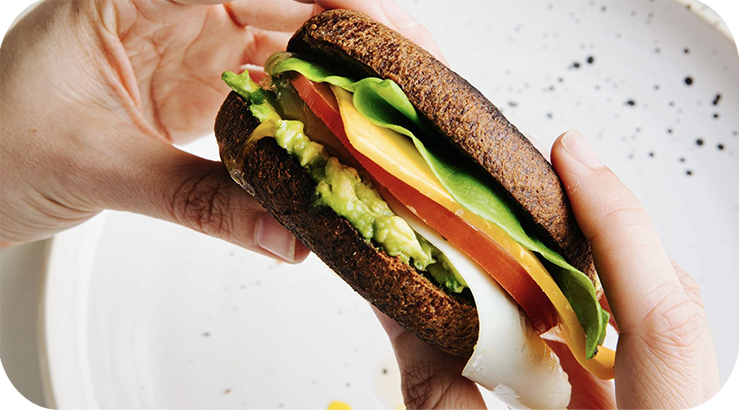
February 1, 2022 BY Unbun Foods
Cait Mizzi, CFNP
While the diet wars continue to wage between plant-based advocates, keto warriors, and calorie counters, there does seem to be one thing that most health experts can agree on, “eat less processed foods.”. We hear it all the time, but what are processed foods, and why do we need to eat less of them?
Technically speaking, any food that hasn’t been pulled directly out of the ground and then eaten is processed. But there is way more to it than that, so let’s unpack this a little bit.
Real, Whole, Foods
Entirely whole, these foods are in their natural state, with their vitamins, minerals, enzymes, fibres, and other nutrients still wholly intact. An apple, a strawberry, a cucumber, an egg – you can consume any one of these items in its complete, unadulterated form.
Some of these foods might then be minimally processed - peeled, chopped, crushed, dried, flash frozen, or pasteurized for better storage, convenience or even to make them safer to consume. These foods would include fruits, vegetables, raw meat, raw dairy, and raw nuts. A bagged salad or baby carrots are processed, albeit minimally, as the whole food is still mostly intact.
Any food which is altered during preparation is being processed - the greater the alteration, the more processing involved. A loaf of homemade sourdough bread, for example, is more processed than a bag of pre-cut green beans. The wheat is grown, harvested, sorted, washed, ground to flour, mixed with salt, oil, a starter, or other ingredients and then baked before you slice it, dress it, and turn it into a sandwich. In contrast, those pre-cute green beans were picked and destemmed. Thus, processed foods exist on a spectrum.
Heavily Refined & Ultra-Processed
According to a study in the medical journal BMJ Open, ultra-processed foods are “formulations of several ingredients which, besides salt, sugar, and fats, include food substances not used in culinary preparations.”
Emulsifiers, anti-caking agents, mold inhibitors, artificial sweeteners, colours, and flavours; used to moisten, thicken, stabilize, dye, or preserve the final product. These compounds and chemical additives are then added to ingredients that are made from substances derived from whole food. For example, industrialized oils, refined sugars, chemically extracted fibres, and starches. These can be added to create what looks like something you’d make from scratch at home, except with a much longer shelf life, addictive flavour profile, more marketable, less nutritious, and highly profitable for the manufacturer.
Store-bought bread, packaged cookies, protein bars, plant-based meats, frozen dinners – are all examples of heavily processed food. Oftentimes, all that’s left is a peppering of elements from what once was a kernel of corn or a grain of wheat, amongst a slurry of lab-made dyes and flavours that keep you coming back for more.
In the US, the UK, Australia, and Canada, more than 55% of daily calories come from ultra-processed foods. Despite dietary guidelines stating that we must consume more fresh, whole foods and less processed and ultra-processed foods.
In most cases, these highly refined and heavily processed foods displace natural, nutrient-dense, whole foods from the diet, potentially leaving the population very well fed yet entirely undernourished. Not to mention all the various agents required to transform one ingredient into the next, many of which are seen to negatively impact the gut microbiome, drive inflammation and even cross the blood-brain barrier.
Research reveals those diets high in ultra-processed foods can also lead to increased risk of cancer, metabolic syndrome, type 2 diabetes, cardiovascular disease, and depression.
It can feel overwhelming to sort through what is and isn’t. So here is a quick reference guide to help you increase your intake of natural, whole foods while staying clear of the ultra-processed franken-foods you should ignore.
Avoid Ultra-Processed Foods
Soft drinks, store-bought bread, boxed cookies, crackers and pastries, cake mix, frozen dinners, conventional ice cream, chocolate bars, candy, and protein bars (even if they’re labelled “keto” or “vegan,” they’re likely ultra-processed). If there is an ingredient on the box that you can’t quickly source on its own, leave it on the shelf where it belongs.
Occasionally Enjoy Processed Foods
Jarred sauces, salad dressings, condiments, tinned soup, freshly baked bread, sausages, and deli meats with clean ingredients you recognize and that will spoil in a few days once opened.
Aim For Minimally Processed Foods
Extra virgin olive oil, avocado oil, coconut oil, nut butter (where the only ingredients are nuts), whole grain and nut flours, frozen vegetables, frozen and dried fruit, yogurt, whole milk, butter, and ghee.
Indulge In Whole, Unprocessed Foods
Fresh fruit and vegetables, tubers, legumes, fresh fish, and pasture-raised meat, fresh eggs, raw nuts, and raw seeds.
